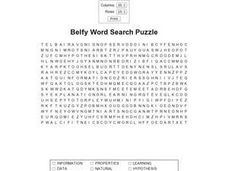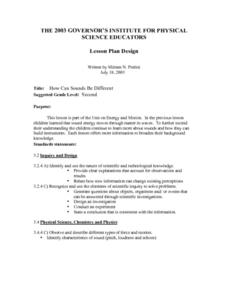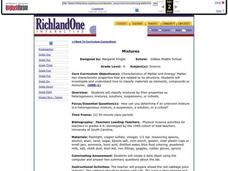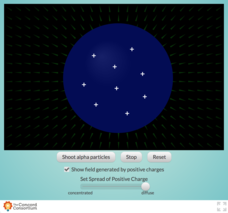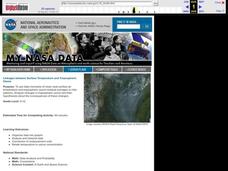Curated OER
Belfy Word Search
In this language arts worksheet, students study 20 words in a word bank, then locate them in a word search puzzle. The words appear to be related to chemistry but the meaning of the title is not known.
Curated OER
How Can Sounds Be Different
Second graders explore energy and motion. They investigate how sound energy moves in waves. Students explore how sounds are varied and how the instruments that make those sounds are built. They observe sounds being produced and predict...
Curated OER
Methods of Heat Transfer
Eighth graders discuss the forms of heat transfer that relate to the human body. Discussion revolves around the ability of different designs of hats to change the rate of heat transfer to and from the body. Students then experiment...
Curated OER
Phases of Matter
Pupils comprehend the different phases of matter. They give examples of each phase and describe the processes of changing between these phases. Students are asked what is plasma? They are asked what is the four phases of matter? ...
Curated OER
Mixtures
Sixth graders experiment with mixtures. For this chemistry lesson, 6th graders determine which mixtures are considered heterogeneous, a suspension, a solution or a colloid. Students create a data sheet of what they discover.
Curated OER
Global Warming and Hurricanes: Is an Increase in the Number of Stronger Hurricanes an Indicator of Global Warming
Ninth graders investigate whether stronger hurricanes are signs of global warming. In this environmental science lesson, 9th graders research both sides of the issue about global warming. They debate for or against this issue in class.
Concord Consortium
Concentrating Charge and Electric Fields
How did Rutherford determine that the nucleus was the center of an atom? Take a look inside the famous Gold Foil Experiment with an interesting interactive. Learners fire a beam of alpha particles at a nucleus containing variable...
Curated OER
Root, Root, Root for the Nutrients
Students observe the growth of a seed, predict what will happen when seeds are planted without soil, and conduct an experiment using a hydroponics system.
Curated OER
The Effects on Flight Characteristics/Performance Due To Variations in Design of Sled Kites.
Students expand upon previous lessons with sled kites by varying the dimensions or materials while building a news sled kite while working in a team. They fly their original kites and the new ones under similar conditions to determine...
Virginia Department of Education
Properties of Compounds and Chemical Formulas
Young chemists have unknown compounds they need to sort. Performing three different tests on each, the chemical behaviors they observe become the basis for data analysis.
Curated OER
Metal Composition & the U.S. Mint
Students study the meaning, symbolism, and value of U.S. coins,
especially the quarter. Theyresearch why in 1965 the U.S. Mint decided to
change the metal composition of the quarter to copper coated with nickel.
In addition, they perform...
Curated OER
Life in Extreme Environments - Lakes Under Ice
High schoolers collect chemical, physical, and biological data from a local lake throughout the year. In addition, students discuss the design of an experimental structure for water collection at several specific depths as well as assess...
Curated OER
Linkages Between Surface Temperature And Tropospheric Ozone
Students organize and analyze data regarding changes in tropospheric ozone and then hypothesize about the consequences of these changes.
Curated OER
Density
Students, in groups, design a procedure to calculate the mass of gas molecules in the classroom by measuring the volume of the classroom and researching the density of air. They apply changes in air density with altitude and effects on a...
Virginia Department of Education
States of Matter
Scientists have been studying exothermic reactions before they were cool. The lesson begins with a discussion and a demonstration of heat curves. Scholars then determine the heat of fusion of ice and the heat needed to boil water through...
Curated OER
Busted Bubbles
Using the scientific method, and bubble gum, learners conduct a motivating experiment. After conducting a series of tests involving bubble gum, they graph and analyze their results. This is the type of activity everyone loves.
Urbana School District
Magnetism
The compass was first used in 206 B.C., but we didn't discover magnetic poles until 1263 A.D. Presentation begins with the history of magnetism before continuing on to magnetic fields, magnetic forces, electromagnets, currents,...
Curated OER
Determination of Phosphates
Students engage in a laboratory lesson in order to increase understanding of the impact of phosphates at the chemical and ecological levels. The lab exercise is completed with the goal of getting them to predict the outcomes and future...
Curated OER
Water Quality
Students play the role of scientists testing for water quality in the area. In this ecology lesson, students determine the water sample's pH, temperature, dissolved oxygen and turbidity. They write a journal reflection after the activity.
Curated OER
Food & Science - How Healthy is Your Diet?
Learners experiment with various foods to determine fat and starch content. They rub jam, peanut butter, bananas, and other foods in a small circle on a piece of paper, and observe the results. If there is a high fat content in the...
Curated OER
How Can we Measure the Rate of a Chemical Reaction?
Students examine different types of chemical reactions. They explore how alcohol molecules affect the reaction rates. They answer discussion questions to end the lesson.
Curated OER
Solution Shapes
Eighth graders examine different solutions. In this solution material lesson students complete a lab activity and several worksheets.
Curated OER
Teaching the Scientific Method Using Adhesives
Learners research on the history of adhesives. In this science instructional activity, students select one test to use in finding the stickiness of adhesives. They collect data and formulate a conclusion.
Curated OER
The Energy Debate - Energy of Peanut
Learners articulate the difference between the terms heat and temperature. They calculate the amount of energy associated with a given temperature rise and design an experiment to measure the energy of a fuel.


